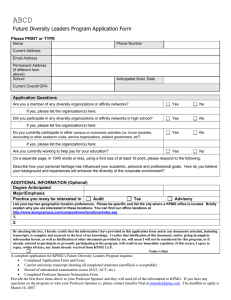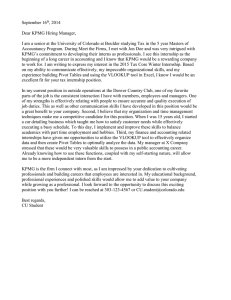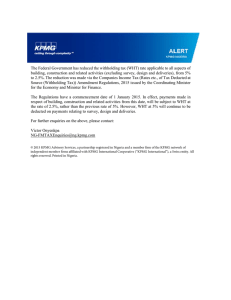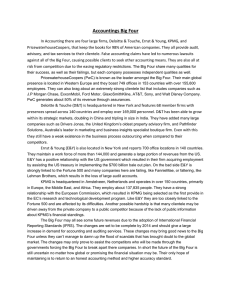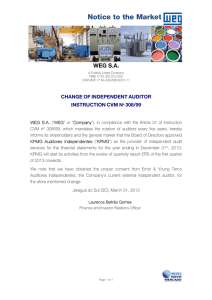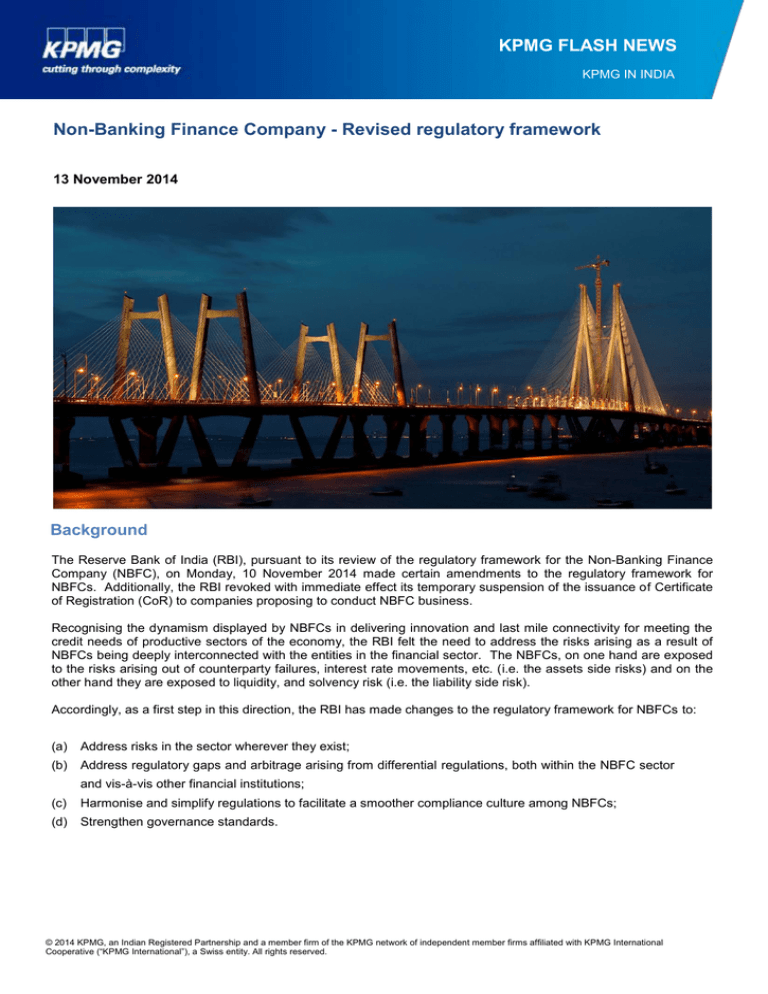
KPMG FLASH NEWS
KPMG IN INDIA
Non-Banking Finance Company - Revised regulatory framework
13 November 2014
Background
The Reserve Bank of India (RBI), pursuant to its review of the regulatory framework for the Non-Banking Finance
Company (NBFC), on Monday, 10 November 2014 made certain amendments to the regulatory framework for
NBFCs. Additionally, the RBI revoked with immediate effect its temporary suspension of the issuance of Certificate
of Registration (CoR) to companies proposing to conduct NBFC business.
Recognising the dynamism displayed by NBFCs in delivering innovation and last mile connectivity for meeting the
credit needs of productive sectors of the economy, the RBI felt the need to address the risks arising as a result of
NBFCs being deeply interconnected with the entities in the financial sector. The NBFCs, on one hand are exposed
to the risks arising out of counterparty failures, interest rate movements, etc. (i.e. the assets side risks) and on the
other hand they are exposed to liquidity, and solvency risk (i.e. the liability side risk).
Accordingly, as a first step in this direction, the RBI has made changes to the regulatory framework for NBFCs to:
(a)
Address risks in the sector wherever they exist;
(b)
Address regulatory gaps and arbitrage arising from differential regulations, both within the NBFC sector
and vis-à-vis other financial institutions;
(c)
Harmonise and simplify regulations to facilitate a smoother compliance culture among NBFCs;
(d)
Strengthen governance standards.
© 2014 KPMG, an Indian Registered Partnership and a member firm of the KPMG network of independent member firms affiliated with KPMG International
Cooperative (“KPMG International”), a Swiss entity. All rights reserved.
While making the amendments, the RBI drew support from the recommendations made by Usha Thorat Committee
1
2
and Dr. Nachiket Mor Committee . The amendments made are as follows:
Sr.
No.
1.
Amendment made
Requirement of minimum Net Owned Fund (NOF)
2.
Particulars
Existing NOF
requirement
Revised NOF
requirement by end
of March 2016
Revised NOF
requirement by end
of March 2017
Companies applying for CoR after 21
April 1999
INR 20 million
INR 20 million
INR 20 million
Companies that were already in
existence before 21 April 1999
INR 2.5 million
INR 10 million
INR 20 million
A statutory auditor's certificate certifying compliance to the revised levels at the end of each of the two
financial years as given above, is mandatory.
Deposit acceptance
NBFC-Asset
Finance Company
(AFC)
Unrated AFC [Refer
Note (a)]
Rated AFC [Refer
Note (b)]
Existing limits
Revised limits
Lower of 1.5 times of NOF or INR
100 million
To get them rated by 31 March 2016,
failing which they cannot renew or
accept fresh deposits
4 times of NOF
1.5 times of NOF
a) By the time rating is obtained, or rating obtained is of sub-investment grade, the existing deposits can
only be renewed on maturity and no fresh deposits can be accepted.
b) AFCs holding deposits in excess of the revised limit should not access fresh deposits or renew existing
ones till they conform to the new limits, the existing deposits can run off till maturity.
1
2
Working Group on Issues and Concerns in the NBFC Sector
Committee on Comprehensive Financial Services for Small Businesses and Low Income Households
© 2014 KPMG, an Indian Registered Partnership and a member firm of the KPMG network of independent member firms affiliated with KPMG International
Cooperative (“KPMG International”), a Swiss entity. All rights reserved.
3.
Criteria for non-deposit taking NBFC (NBFC-ND) and systemically important non-deposit taking NBFC
(NBFC-ND-SI)
Category of NBFC
NBFC-ND
NBFC-ND-SI
4.
Existing asset size
Revised asset size
less than INR 1,000 million
less than INR 5,000 million
INR 1,000 million and above
INR 5,000 million and above
The total assets of NBFCs in a group (including deposit taking NBFCs) to be added to determine the asset
size of the two categories as mentioned above. The definition of the word ‘group’ and ‘Companies in the
group’ is as per various Accounting Standards and Securities and Exchange Board of India (Acquisition of
Shares and Takeover) Regulations, 1997 for the definition of promoter-promotee.
Prudential norms and conduct of business regulations
Category of NBFC
NBFC-ND
Prudential norms
Conduct of business
regulations
Applicable (to the limited extent) if
public funds are accepted
Applicable if it has customer
interface
Applicable
Applicable if it has customer
interface
NBFC-ND-SI
5.
Prudential norms as applicable to NBFCs-ND
6.
Public funds have been defined to include funds raised directly or indirectly through public deposits,
commercial papers, debentures, inter-corporate deposits and bank finance, but excludes funds raised by
issue of instruments compulsorily convertible into equity shares within a period not exceeding five years
from the date of issue.
NBFC-NDs exempted from maintaining Capital Risk Adequacy Ratio (CRAR) and complying with Credit
Concentration Norms.
A leverage ratio of seven made applicable for all NBFCs-ND to link their asset growth with the capital they
hold. Leverage ratio defined as total outside liabilities/owned funds.
Prudential norms as applicable to NBFC-ND-SI and NBFC-D
Tier 1: Capital requirement
Current requirement of CRAR of 15 per cent remains unchanged. The revised requirement of Tier 1:
Capital is as under:
© 2014 KPMG, an Indian Registered Partnership and a member firm of the KPMG network of independent member firms affiliated with KPMG International
Cooperative (“KPMG International”), a Swiss entity. All rights reserved.
Revised requirement
Existing
requirement
NBFC
By end of March
2016
By end of March
2017
NBFC-D and NBFC-ND-SI
7.5%
8.5%
10%
Infrastructure Finance Company (‘IFC’)
10%
10%
10%
NBFC engaged in financing of gold
jewellery
12%
12%
12%
The minimum Tier 1 capital requirement for NBFCs primarily engaged in lending against gold jewellery
shall be reviewed by the RBI for harmonisation in due course.
Asset classification
The asset classification norms are being brought in line with that of banks, in a phased manner by March
2018, as given below.
Revised regulations
For the
financial
year ending
31 March
2016
For the
financial year
ending 31
March 2017
For the
financial year
ending 31
March 2018
and
thereafter
Classification
Existing
regulations
Lease rental and
hire-purchase
assets
NPA
12 months
If overdue for
9 months
If overdue for 6
months
If overdue for
3 months
Assets other than
lease rental and
hire-purchase
assets
NPA
6 months
If overdue for
5 months
If overdue for 4
months
If overdue for
3 months
Sub-standard
If NPA for a
period not
exceeding 18
months
If NPA for a
period not
exceeding 16
months
If NPA for a
period not
exceeding 14
months
If NPA for a
period not
exceeding 12
month
Doubtful
If it has
remained
sub-standard
for a period
exceeding 18
months
If it has
remained
sub-standard
for a period
exceeding 16
months
If it has
remained substandard for a
period
exceeding 14
months
If it has
remained substandard for a
period
exceeding 12
months
Nature of asset
All loan and hirepurchase and lease
assets
All loan and hirepurchase and lease
assets
© 2014 KPMG, an Indian Registered Partnership and a member firm of the KPMG network of independent member firms affiliated with KPMG International
Cooperative (“KPMG International”), a Swiss entity. All rights reserved.
Provisioning of standard assets:
The percentage of provision for standard assets has been revised as under:
Revised requirement
Existing
requirement
Particulars
Provision for standard assets
0.25%
By end of
March 2016
By end of
March 2017
By end of March
2018 and
thereafter
0.30%
0.35%
0.40%
Credit/investment concentration norms for AFCs
7.
The credit concentration norms for AFCs brought in line with other NBFCs with immediate effect (the
additional leeway of 5 per cent withdrawn); all existing excess exposures allowed to be run off till maturity.
Corporate governance and disclosure norms
(A) Board Committee
Existing regulations
Requirements
NBFC-D
(Deposits>=
INR 500
million)
Audit Committee
Required
Required
Nomination
Committee
Recommended
Recommended
Risk
Management
Committee
Recommended
-
Rotation of audit
partners every
three years
NBFC-D
(Deposits>=
INR 200
million)
Revised regulations
NBFCND(Asse
ts>=
INR 500
million)
Required
NBFCND(Assets>=
INR 1,000
million)
NBFC-D
NBFC-NDSI
Required
Required
Required
-
Recommended
Required
Required
Recommended
-
Recommended
Required
Required
Recommended
-
-
Required
Required
Further, the Audit Committee of all NBFCs-ND-SI and all NBFCs-D must ensure that an Information
Systems Audit of the internal systems and processes is conducted at least once in two years.
© 2014 KPMG, an Indian Registered Partnership and a member firm of the KPMG network of independent member firms affiliated with KPMG International
Cooperative (“KPMG International”), a Swiss entity. All rights reserved.
(B) Fit and proper criteria for Directors
Existing regulations
Revised regulations
No fit and proper criteria prescribed for the board
The directive issued to banks on undertaking due
diligence on persons before appointing them on
the boards of banks have been extended to
NBFC-D and NBFC-ND-SI
A declaration and undertaking in a prescribed
format is to be obtained from the Directors by the
NBFC
Directors to sign a Deed of Covenant with the
NBFC (format prescribed) essentially for
disclosure of interest in any contract, details of
other directorships/memberships, list of relatives,
to exercise due care and skill in performance of
duties, to act in fiduciary capacity, etc. Similarly,
the NBFC covenants to the Directors about the
board procedures, voting rights at board meetings,
qualification requirements, all relevant information
for taking informed decisions, etc.
(C) Disclosure in financial statements
Existing regulations
8.
The existing disclosures are now applicable for
NBFCs-ND-SI and for all NBFCs-D.
Further, with effect from 31 March 2015, all
NBFCs-ND-SI and NBFCs-D shall additionally
disclose the following in annual financial
statements:
Registration, etc. obtained from other financial
sector regulators;
Ratings assigned by credit rating agencies
during the year;
Penalties, if any by any regulator.
Area, country of operation, joint venture
partners and overseas subsidiaries;
Asset liability profile, extent of financing of
parent company products, NPAs and
movement of NPAs, details of all off-balance
sheet exposures, structured products, etc.
Off-site reporting
9.
Under the existing regulations, NBFCs with
assets of INR 1,000 million and above were
required to make additional disclosures in their
balance sheets from the year ending 31 March
2009 relating to CRAR, exposure to real estate
sector, and maturity pattern of assets and
liabilities, respectively.
Revised regulations
NBFCs-ND (including investment companies) are required to submit only a simplified annual return (the
details of which shall be separately communicated by the RBI).
Applicability of the above to NBFC-Micro Finance Institutions (NBFC-MFI) and registered Core
Investment Companies (CIC)
The above amendments shall be applicable to NBFCs-MFI and registered CIC except where contrary
provisions exist under NBFC-MFI Directions 2011 and CIC Directions, 2011, respectively.
© 2014 KPMG, an Indian Registered Partnership and a member firm of the KPMG network of independent member firms affiliated with KPMG International
Cooperative (“KPMG International”), a Swiss entity. All rights reserved.
Our comments
The RBI had temporarily suspended issuance of new CoR on 1 April 2014 in wake of its review of the NBFC
framework. With the RBI notifying the amendments to the NBFC framework, the temporary suspension has been
withdrawn which will be welcomed by all the players waiting to enter the NBFC space.
Pertinently, the proposal requiring prior approval of the RBI for appointment of a Chief Executive Officer and
provisions relating to captive NBFCs do not find place in final regulations. In regard to the amendments made to the
NBFC regulations, they clearly seem to suggest that the RBI intends to ensure transparency; strengthen the capital
and provisioning requirements to enable NBFCs withstand internal and external shocks; harmonise the regulations
applicable across all categories of NBFCs (barring few exceptions) and concentrate on regulating only such players
which could seriously pose a threat to the economic system and provide only registration requirement for entities that
do not pose any systemic risk.
While the higher Tier I capital requirements and creation of provisions on an accelerated basis (at par with banks)
may impact the profitability of the NBFCs, in the long run these measures could strengthen the standing of NBFCs
and could help ensure that only serious players remain in the industry. Also, the emphasis on improvement in
corporate governance and increased role of statutory auditors should go a long way in improving the sector.
© 2014 KPMG, an Indian Registered Partnership and a member firm of the KPMG network of independent member firms affiliated with KPMG International
Cooperative (“KPMG International”), a Swiss entity. All rights reserved.
www.kpmg.com/in
Ahmedabad
Commerce House V, 9th Floor,
902 & 903, Near Vodafone House,
Corporate Road,
Prahlad Nagar,
Ahmedabad – 380 051
Tel: +91 79 4040 2200
Fax: +91 79 4040 2244
Bengaluru
Maruthi Info-Tech Centre
11-12/1, Inner Ring Road
Koramangala, Bangalore 560 071
Tel: +91 80 3980 6000
Fax: +91 80 3980 6999
Chandigarh
SCO 22-23 (Ist Floor)
Sector 8C, Madhya Marg
Chandigarh 160 009
Tel: +91 172 393 5777/781
Fax: +91 172 393 5780
Chennai
No.10, Mahatma Gandhi Road
Nungambakkam
Chennai 600 034
Tel: +91 44 3914 5000
Fax: +91 44 3914 5999
Delhi
Building No.10, 8th Floor
DLF Cyber City, Phase II
Gurgaon, Haryana 122 002
Tel: +91 124 307 4000
Fax: +91 124 254 9101
Hyderabad
8-2-618/2
Reliance Humsafar, 4th Floor
Road No.11, Banjara Hills
Hyderabad 500 034
Tel: +91 40 3046 5000
Fax: +91 40 3046 5299
Kochi
Syama Business Center
3rd Floor, NH By Pass Road,
Vytilla, Kochi – 682019
Tel: +91 484 302 7000
Fax: +91 484 302 7001
Kolkata
Unit No. 603 – 604,
6th Floor, Tower – 1,
Godrej Waterside,
Sector – V, Salt Lake,
Kolkata 700 091
Tel: +91 33 44034000
Fax: +91 33 44034199
Mumbai
Lodha Excelus, Apollo Mills
N. M. Joshi Marg
Mahalaxmi, Mumbai 400 011
Tel: +91 22 3989 6000
Fax: +91 22 3983 6000
Pune
703, Godrej Castlemaine
Bund Garden
Pune 411 001
Tel: +91 20 3050 4000
Fax: +91 20 3050 4010
The information contained herein is of a general nature and is not intended to address the circumstances of any particular individual or entity. Although we
endeavour to provide accurate and timely information, there can be no guarantee that such information is accurate as of the date it is received or that it will continue
to be accurate in the future. No one should act on such information without appropriate professional advice after a thorough examination of the particular situation.
© 2014 KPMG, an Indian Registered Partnership and a member firm of the KPMG network of independent member firms affiliated with KPMG International
Cooperative (“KPMG International”), a Swiss entity. All rights reserved.
The KPMG name, logo and “cutting through complexity“ are registered trademarks of KPMG International Cooperative (“KPMG International”), a Swiss entity.
© 2014 KPMG, an Indian Registered Partnership and a member firm of the KPMG network of independent member firms affiliated with KPMG International
Cooperative (“KPMG International”), a Swiss entity. All rights reserved.

